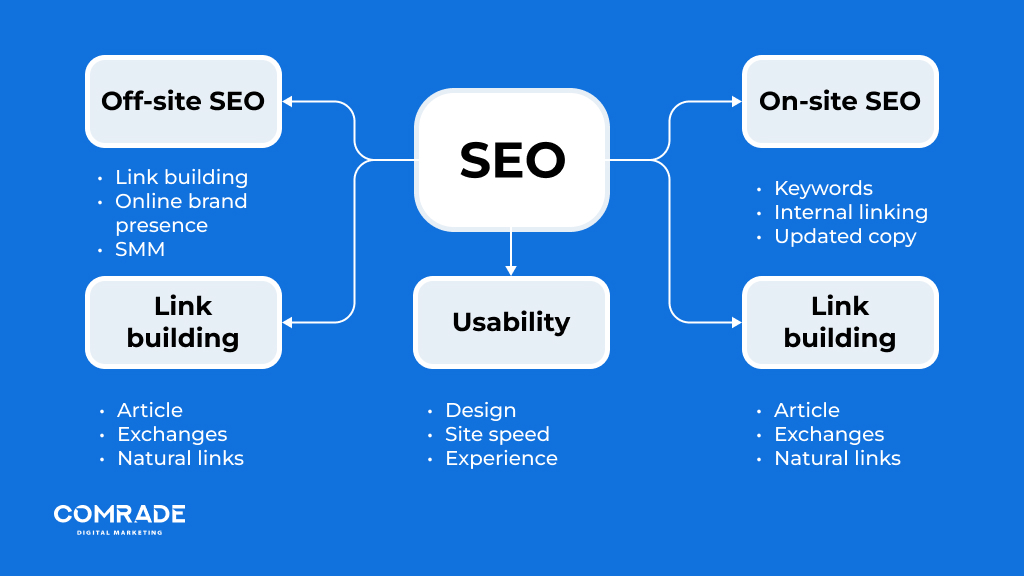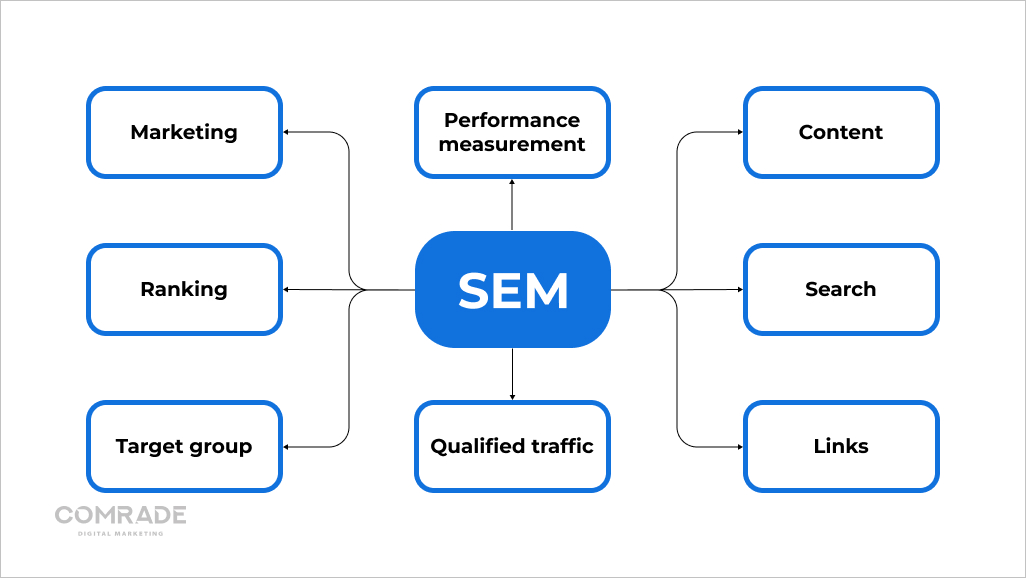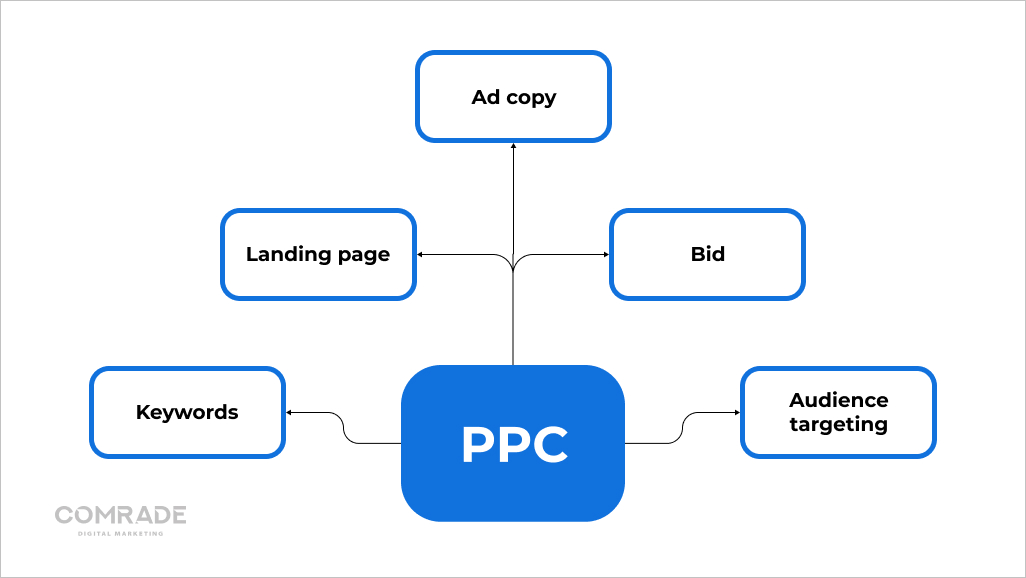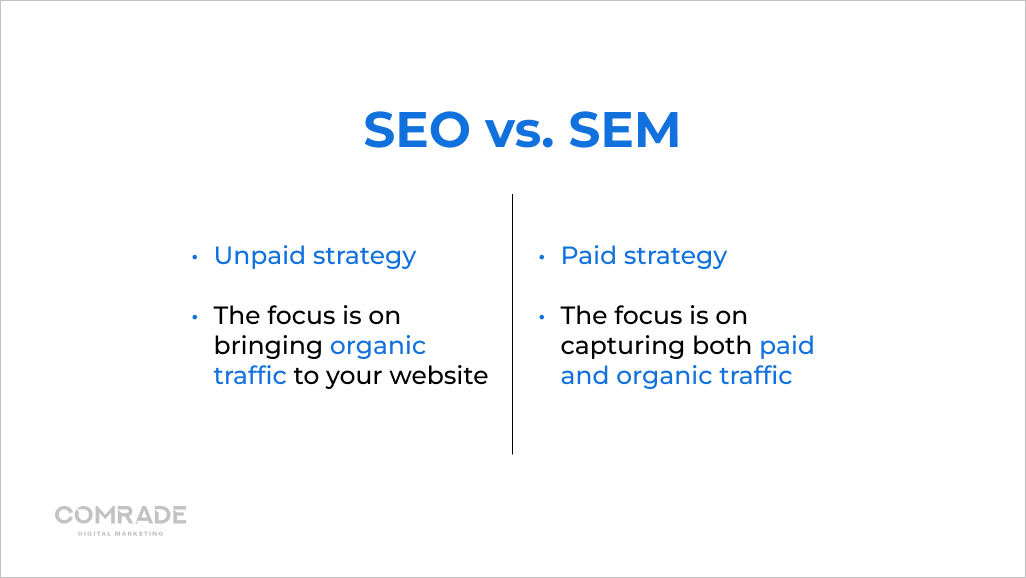Understanding the fundamental differences between SEO vs SEM is crucial for developing effective digital marketing strategies. Search Engine Optimization (SEO) and Search Engine Marketing (SEM) each play distinct roles in improving your website’s visibility and driving targeted traffic. Search engine optimization (SEO) is the process of improving the visibility of a website in organic search results, while search engine marketing (SEM) is a broader term that includes both SEO and paid search tactics.
Both SEO and PPC are the most effective ways to get your business featured in search results, and both are part of SEM campaigns. In this blog, we explain what they are and how they work to improve your online presence and maximize your revenue.
What Is SEO?

Search Engine Optimization (SEO) is the process of improving organic search visibility and rankings in search engine results pages (SERPs) through strategic optimization techniques. It is a means of increasing traffic to a website from free, organic, editorial, or organic search results. A successful SEO campaign can lead to higher SERP rankings and visibility, as well as generate traffic for the website.
SEO efforts describe the process of making web pages easier for search engine indexing software, known as “crawlers,” to find, scan, and index your website. When marketers implement SEO service packages, they optimize site speed, content relevance, and link popularity, so its pages are more relevant and popular with search queries, and, thus, rank better.
What’s the difference between SEO and PPC?
Basically, SEO refers to the way of optimizing your website’s pages to drive organic traffic, while PPC refers to advertising that appears at the top, or the bottom, of search results pages (SERP) or other websites.
How Does Search Engine Optimization Drive Traffic?
There are four aspects of SEO used to drive more traffic:
- On-page SEO: Optimizing web pages and marketing content for target keywords.
- Off-page SEO: Improving the authority of your domain through backlinks.
- Technical SEO: Ensuring a website meets the technical requirements of modern search engines.
- Local SEO: The most recent development in SEO, local SEO, is the practice of optimizing a website’s online presence for better visibility within local search results.
As expert marketers, we recommend starting with SEO since it is the most cost-effective tactic. Statistically, 41% of marketers worldwide say they get the highest ROI from SEO. In fact, organic search results account for over 50% of website traffic.
How Long Does SEO Take?
Typically, the initial results of your SEO campaign will appear after 3-6 months, and it will take more than 6 months to see significant results. Of course, this varies depending on the competitiveness of your industry and the state of your business. If you have a new website, it may take a little longer to see results. Conversely, if you have an existing website that just needs a bit of optimization, you may see results much sooner.
How Much Does SEO Cost?
SEO can be an affordable way to market your business online, with SEO packages typically around $3000+ per month. Remember that with the right agency behind you, even large investments into SEO will greatly pay off in the long run. Of course, the exact SEO costs will depend on the size and scope of your project, as well as the competitive landscape in your industry. However, SEO is typically a very cost-effective way to improve your visibility and attract new customers.
What Is SEM?

Search Engine Marketing (SEM) combines paid search advertising and organic SEO strategies to maximize visibility in search results, offering both immediate and long-term benefits for businesses investing in digital marketing. It is one of the most effective ways to expand your business in an increasingly competitive marketplace.
After all, how do you stand out among one billion websites online?
Search engine marketing intersects with SEO, as it includes strategies like rewriting the content of a website and its architecture to achieve higher rankings. However, it generally refers to PPC marketing, where advertisers only pay for impressions that result in visitors, making it an efficient way for a company to spend its marketing budget.
Since consumers use queries with the search intent of finding information of a commercial nature, they are already in the right state of mind to make a purchase. PPC is more profitable in the short term compared to other advertising platforms like social media, where users aren’t explicitly searching for something,
You might consider search engine marketing an umbrella term covering SEO and Paid Search ads (PPC) and their efforts to direct organic and paid traffic to your website.
How Long Does SEM Take?
SEM, or search engine marketing, is a process that can take a bit of time to complete. Depending on the size of your business, the complexity of optimizing your website, and your SEM campaign goals, the process can take anywhere from a few weeks to several months. However, once a campaign is up and running, it can be managed relatively easily and does not require a lot of ongoing maintenance.
How Much Does SEM Cost?
The average cost of SEM for a company is $35,000 per year. SEM spending can exceed $80,000 if services include mobile advertising, banner advertising, email campaigns, and social media management.
As you can see, SEM can be a very affordable way to market your business, especially if you are willing to do some of the work yourself. However, if you want to hire someone to tackle the work for you, an SEM strategy can be more expensive. The cost will also depend on how competitive your industry is and how much website traffic you want to generate.
What Is PPC?

Pay-per-click advertising is an advertising model in which an advertiser pays a publisher every time an advertisement is “clicked” on. Offered primarily by search engines (Google) and social networks (Facebook, Twitter, Instagram, LinkedIn), paid advertising reaches consumers at the right time: When they are open to new information.
A PPC campaign is non-intrusive and doesn’t interrupt what users are doing online. However, just like SEO, a lot goes into building successful pay-per-click advertisements. Advertisers have to select the informational keywords, organize them into paid ad groups, and develop landing pages optimized for conversions.
With PPC advertising, marketers cannot simply pay more for their ads to appear more prominently than their competitors. Instead, ads are subject to an Ad Auction, an automated process that Google and other major search engines use to determine the relevance and validity of advertisements that appear on SERPs.
PPC ad campaigns encompass numerous types of online advertising, such as:
- Search advertising
- Display advertising
- Social media advertising
- Remarketing
- Sequential remarketing
- Google shopping ads
The Elements of Paid Advertising
There are several components needed to make paid search ads work:
- Account structure: PPC accounts are generally structured from campaign to ad group to ad. Having the correct account structure allows you to optimize ad spending. For instance, ads about watches would typically be grouped into the same ad campaign with similar keywords.
- Bids: These determine how much your company will pay (at most) for an ad click. Google Ads offers automated bidding that helps your business accomplish its paid ad placement goals without overspending.
- Quality score: This measurement is specific to Google Ad. A high-quality score means your digital ads are relevant to users, which lowers the price and ensures better ad placements.
- Ad assets: These range from compelling ad copy to high-quality images and video to persuade a prospect to do business with your company.
How Long Does PPC Take?
PPC is a great way to improve your website’s visibility, but it takes a little time to get going. The first three months of your campaign should be focused on data gathering. This data will help you determine which keywords, target audience, and bids are most effective. After that, you can use that information to make your PPC campaign even more successful. While a PPC campaign can take some time, if you run a well-optimized campaign, you’ll start seeing a steady stream of leads or sales within a few months.
How Much Does PPC Cost?
Generally speaking, PPC costs can range from a few cents to several dollars per click. However, on average, small and mid-sized enterprises spend between $9,000 and $10,000 on Pay-Per-Click (PPC) campaigns each month. The cost can vary depending on a number of factors. This includes the platform you use, the competition, the keywords you target, and your geographic location.
SEO vs SEM Comparison: Key Differences in Search Marketing Strategies

The main difference between SEO and SEM is that SEO is an unpaid strategy, while SEM is a paid strategy. With SEO, the focus is on bringing organic traffic to your website, whereas SEM focuses on capturing both paid and organic traffic.
Therefore, techniques aimed at improving organic positioning in search results fall into the category of SEO, and techniques aimed at appearing among paid search results are categorized as SEM.
Cumulative vs. Instant Results
An SEO campaign takes between six months to a year to yield results. It accrues value over time and leaves lasting results. It is a clear path to reliable and scalable growth. A well-optimized site with good link building and excellent content marketing can hold its search engine position, even if you stepped away for a few weeks.
On the other hand, search engine marketing works well in the short term. It’s excellent for driving search traffic in short bursts, but your website’s visibility wanes as soon as you stop paying for paid search marketing.
SEM Is Easier to Test
The advantage of paid ads is the ability to set up campaigns (A / B testing) in real time. When audiences are first targeted, it’s likely you’ll change the landing page content, whether it’s the copy or visual material, until it’s optimized to produce the best results.
These improvements can be made quickly. However, you cannot test SEO the same way due to the nature of search engine algorithms, which is why some marketers use PPC ads to test what works before implementing informational keywords into their SEO strategy.
Marked Ad vs. Organic Results
Organic results and paid results look different. Paid ad placement has an “Ad” icon in Google search results, whereas organic listings that appear underneath don’t. Paid ads appear as banners on websites, for instance.
They offer ad extensions allowing marketers to enhance standard search text with site links, callouts, phone numbers, review ratings, and more. In contrast, organic search results offer rich snippets that don’t overtly advertise a product or service.
Google Ads and the likes offer greater control over how and when ads are displayed. When it comes to SEO ranking, you have very little control over when your website ranks, only that it should appear for relevant keywords.
SEO vs. PPC Cost
With search marketing, an advertiser pays every single time a user clicks on an ad. Yet, you don’t pay every time a user clicks on an organic listing ranked due to SEO.
A well set-up PPC account can be a low-cost way to generate business leads, especially if you are a business targeting local SEO. However, if you are targeting keywords on a national or international level, costs can accumulate quickly.
Paid initiatives require constant investment, whereas SEO requires initial capital and then some for regular maintenance. If you have a solid acquisition cost, then PPC should be fine, but in contrast to SEO, it can feel like a rough deal if a campaign is poorly executed.
SEO vs. PPC: What Is Best for Digital Marketing?

Compared to PPC, SEO is very slow. As mentioned before, it can take months before you start seeing the results of organic strategies, whereas PPC will garner leads immediately. However, one isn’t necessarily better than the other, as they both achieve different results.
At Comrade Marketing Agency, we encourage clients to invest in both (first SEO, then PPC). Think about it like this: Because a website can never be 100% “optimized,” SEO is an ongoing process. Keywords should be updated (if necessary) every three to six months.
Organic SEO builds credibility and trust over time (long-term). Some users skip ads, so when your website pops up through organic results, it increases credibility to prospects who are already looking for your services.
However, PPC is the way to go if you need short-term results. You don’t have to worry about a search engine’s algorithm impacting your position because you’re bidding for top spots. You just need to make sure you’re using the right keywords.
PPC also allows you to laser-target strictly potential customers, using a variety of demographics and online behavioral tendencies, including specific times of day, which you can’t do with organic SEO.
The perfect marketing campaign combines both tactics because SEO and PPC complement each other in the following ways:
- Effective PPC keyword research and structured data can be used in SEO.
- After a prospect makes initial contact via organic search, you can remarket to them with PPC ads.
- You can test a keyword targeting in PPC before using it in SEO.
Want to speak with an expert?
Call us at (872) 242-1074
Conclusion
When comparing SEO vs SEM strategies, a combined approach that leverages both organic search optimization and paid search marketing typically delivers the best results, balancing short-term gains with sustainable long-term growth. Many successful marketing campaigns integrate SEM, SEO, and PPC because they offer complementary benefits and ensure businesses get the most from their marketing spend.
If you’re interested in finding out more about how SEM, SEO, and PPC can improve your bottom line, then give us a call. As a full-service digital marketing agency, we provide exceptional ROI for our clients, who experience a 70% qualified sales increase on average when working with us!
